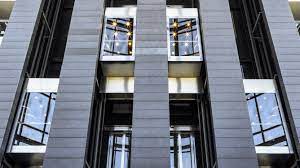New York City, as the most populous area in the country, can literally make its own rules above and beyond those of the state of New York. For example, buildings account for two-thirds of the annual carbon emissions in New York City, and Local Law 97 is part of New York City’s commitment to reduce greenhouse gas emissions by 80% by 2050. Approximately 50,000 commercial and residential buildings in New York City are now required to obtain a Building Energy Efficiency Rating by 2024 or face penalties.
Research has found that one of the factors that can benefit owners in meeting the new regulations is retrofitting existing building components that, in a city as aging as NYC, can represent a major investment. However, companies in the industries most challenged are stepping up with aimed assistance. One of them is TK Elevator which points out that energy retrofits can save up to 70% of an elevator’s usage and help building owners meet the stringent carbon-emission reduction mandates of Local Law 97.
Building owners will be required to obtain Building Energy Efficiency Rating label and display these labels at public entrances. The labels will include the Energy Star Score with corresponding grade. Local Law 97 sets emissions intensity limits for 10 building categories based on building code occupancy groups. Buildings larger than 25,000-sq.ft. must be in compliance by 2024 or face stiff penalties.
Older elevators can account for 10% of a building’s power usage, but an energy retrofit can save up to 70% of an elevator’s power usage. TK Elevator’s modernization includes adding regenerative drive technology, which captures energy generated when the elevator is braking and feeds it back into the building, as well as LED bulbs with automatic shutoff that can reduce energy use in the cab by 90%.
TK Elevator’s commitment to creating healthier elevator systems extends beyond energy retrofits to manufacturing. The company has published four EPDs (Environmental Product Declarations) – the most in the industry. An EPD is an assessment of the environmental impacts of a product over its lifecycle that is verified by an independent third party. TK Elevator was also the first elevator company to publicly disclose the environmental impacts of its elevators in accordance with the Product Category Rules of the Intl. EPD system and is the only elevator company with Declare labels on its elevators. Declare is a transparency platform and nutrition label created by the Intl. Living Future Institute that shares where a product comes from, what it’s made of and where it goes at the end of its life.
In recognition of its environmental efforts, TK Elevator last month received an ‘A’ rating once again from non-profit CDP (Carbon Disclosure Project) for its climate-change initiatives, and also recently received the best rating in the ‘Machinery’ category from Sustainalytics, a global firm specializing in ESG (environmental, social and governance).
Want to tweet about this article? Use hashtags #construction #IoT #sustainability #AI #5G #cloud #edge #futureofwork #infrastructure #technews #construction #manufacturing #sustainability


